Everyone needs to keep a collection of stories and interesting factoids and be ready for the moment it will help move listeners to action. A great storyteller never tells a story the same way twice. Instead, she sees what is unique in each storytelling experience and responds fully to what is demanded.Jeff Dunham, the comedic ventriloquist with his popular act including a character named Achmed, the dead terrorist reminded me of just this fact. I caught him on the NBC morning show being interviewed about his new show and really enjoyed how he answered a tough question. Terrorism is not a topic that usually makes people laugh. He was asked how his audiences react to Achmed and the comedy routine.
He replied, “You know, it’s mixed. As a standup comic, I kind of think if you want to live on the edge…My best analogy is as a kid, when you were making a map and you were burning the edges to try to make it look old..I think the comic, if he wants to push it that way, you are trying to burn the edges enough, and just make sure the paper doesn`t catch on fire. So, I find that people that complain about stuff like this, you know, you have to have a good nose for it, you have to know your audience. You have to push it just far enough, and when you push it too far, you get in trouble.”
Later that night, I landed in another city, got to my hotel and flipped on the TV. There again was Dunham, hyping his new show on another network. Again he was asked a similar question. While he used the same analogy to answer, it was tailored to this reporter’s questions. A stand-up comedian has to memorize a lot of material, but Jeff is a great example of customizing his story to the unique situation.
A story involving your company should sound different each time. Whether you tell it to 2,000 customers at a convention, 500 salespeople at a marketing meeting, 10 stock analysts in a conference call or 3 CEOs over drinks, you should tailor it to the situation. The context of the telling is always a part of the story.
There is a paradox here. Great storytellers prepare obsessively. They think about, rethink, work and rework their stories. As Scott Adelson, an investment banker who uses storytelling to help clients raise capital in public markets, said: “Sheer repetition and the practice it brings is one key to great storytelling. When we help companies sell themselves to Wall Street, we often see the CEO and his team present their story 10, 20, 30 times. And usually, each telling is better and more compelling than the one before.”
At the same time, the great storyteller is flexible enough to drop the script and improvise when the situation calls for it. Actually, intensive preparation and improvising are two sides of the same coin. If you know your story well, you can riff on it without losing the thread or the focus.
